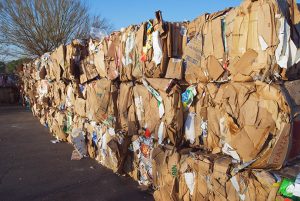
David Biderman, SWANA executive director
In a recent interview, SWANA leader David Biderman said communities don’t want to undo decades of outreach work and tell residents to stop putting certain items in the bin, even if China’s scrap policies are shaking up market realities.


 When it began facing constricted fiber exports to China, Waste Management adapted by selling into alternative markets. As a result, it has been able to avoid stockpiling or landfilling recyclables, company CEO Jim Fish said.
When it began facing constricted fiber exports to China, Waste Management adapted by selling into alternative markets. As a result, it has been able to avoid stockpiling or landfilling recyclables, company CEO Jim Fish said.


 A movie studio that paid $1,500 to purchase a chair will often want it gone as soon as the shoot is finished. The L.A. Shares program in America’s second-largest city works to ensure the chair is donated instead of sent into the waste stream.
A movie studio that paid $1,500 to purchase a chair will often want it gone as soon as the shoot is finished. The L.A. Shares program in America’s second-largest city works to ensure the chair is donated instead of sent into the waste stream. Cartons, corrugate, expanded polystyrene, film and pouches are among the materials and products California officials say could be subject to mandatory packaging management rules.
Cartons, corrugate, expanded polystyrene, film and pouches are among the materials and products California officials say could be subject to mandatory packaging management rules. The upstream impacts of China’s import restrictions have been increasingly covered in national and local press, raising the level of public consciousness about where recyclables ultimately end up and how that could all change.
The upstream impacts of China’s import restrictions have been increasingly covered in national and local press, raising the level of public consciousness about where recyclables ultimately end up and how that could all change. MRF company ReCommunity and Ann Arbor, Mich. have agreed to settle their legal dispute without an award of money to either party.
MRF company ReCommunity and Ann Arbor, Mich. have agreed to settle their legal dispute without an award of money to either party. The U.S. OCC market plummeted last week as China substantially slows its recovered material imports. Inside China, the lack of import capability has driven domestic OCC prices sky high.
The U.S. OCC market plummeted last week as China substantially slows its recovered material imports. Inside China, the lack of import capability has driven domestic OCC prices sky high.